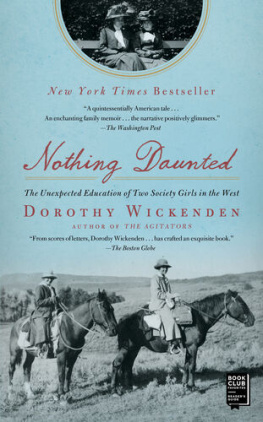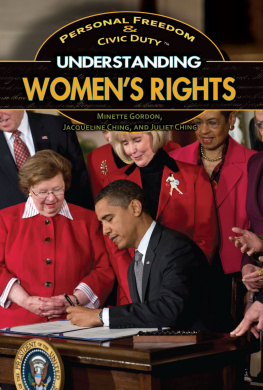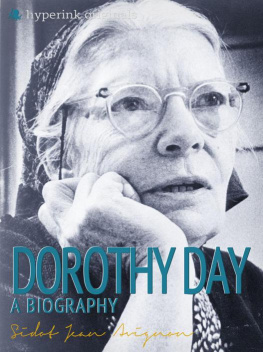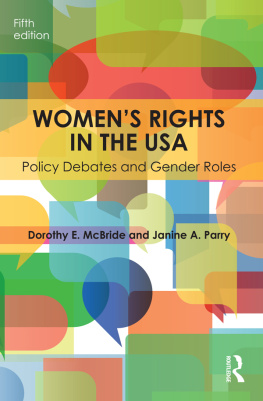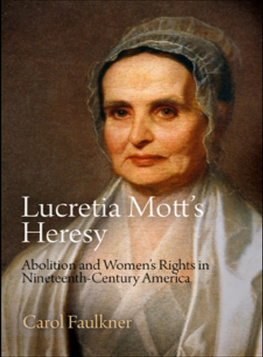Dorothy Wickenden - The Agitators: Three Friends Who Fought for Abolition and Womens Rights
Here you can read online Dorothy Wickenden - The Agitators: Three Friends Who Fought for Abolition and Womens Rights full text of the book (entire story) in english for free. Download pdf and epub, get meaning, cover and reviews about this ebook. year: 2021, publisher: Scribner, genre: Non-fiction. Description of the work, (preface) as well as reviews are available. Best literature library LitArk.com created for fans of good reading and offers a wide selection of genres:
Romance novel
Science fiction
Adventure
Detective
Science
History
Home and family
Prose
Art
Politics
Computer
Non-fiction
Religion
Business
Children
Humor
Choose a favorite category and find really read worthwhile books. Enjoy immersion in the world of imagination, feel the emotions of the characters or learn something new for yourself, make an fascinating discovery.
- Book:The Agitators: Three Friends Who Fought for Abolition and Womens Rights
- Author:
- Publisher:Scribner
- Genre:
- Year:2021
- Rating:5 / 5
- Favourites:Add to favourites
- Your mark:
- 100
- 1
- 2
- 3
- 4
- 5
The Agitators: Three Friends Who Fought for Abolition and Womens Rights: summary, description and annotation
We offer to read an annotation, description, summary or preface (depends on what the author of the book "The Agitators: Three Friends Who Fought for Abolition and Womens Rights" wrote himself). If you haven't found the necessary information about the book — write in the comments, we will try to find it.
The Agitators: Three Friends Who Fought for Abolition and Womens Rights — read online for free the complete book (whole text) full work
Below is the text of the book, divided by pages. System saving the place of the last page read, allows you to conveniently read the book "The Agitators: Three Friends Who Fought for Abolition and Womens Rights" online for free, without having to search again every time where you left off. Put a bookmark, and you can go to the page where you finished reading at any time.
Font size:
Interval:
Bookmark:
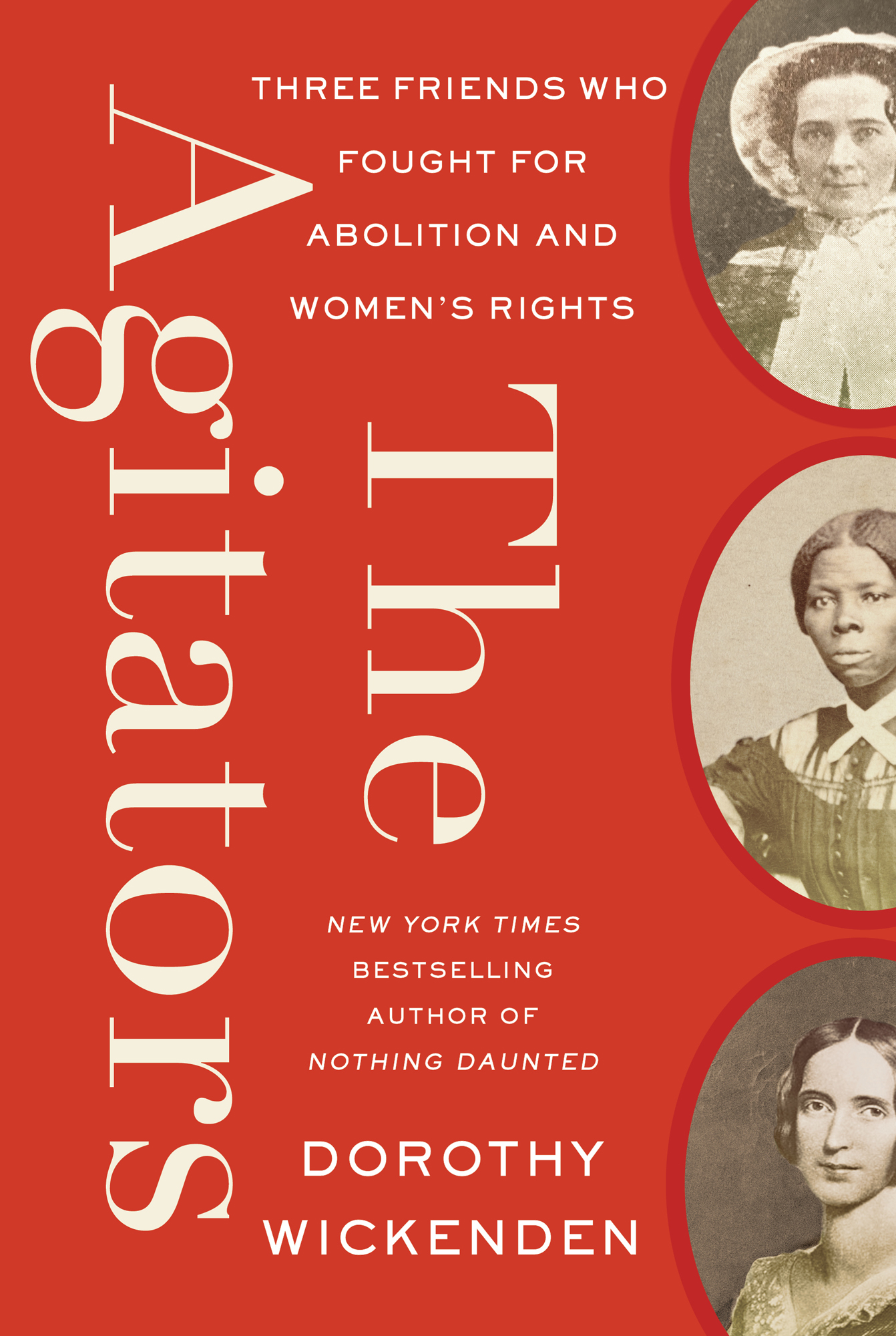

ALSO BY DOROTHY WICKENDEN
Nothing Daunted: The Unexpected Education of Two Society Girls in the West
The New Republic Reader: Eighty Years of Opinion and Debate (editor)

Compromises based on the idea that the preservation of the Union is more important than the Liberty of nearly 4,000,000 human beings cannot be right. Frances A. Seward to William H. Seward, January 19, 1861

Scribner
An Imprint of Simon & Schuster, Inc.
1230 Avenue of the Americas
New York, NY 10020
www.SimonandSchuster.com
Copyright 2021 by Dorothy Wickenden
All rights reserved, including the right to reproduce this book or portions thereof in any form whatsoever. For information, address Scribner Subsidiary Rights Department, 1230 Avenue of the Americas, New York, NY 10020.
First Scribner hardcover edition March 2021
SCRIBNER and design are registered trademarks of The Gale Group, Inc., used under license by Simon & Schuster, Inc., the publisher of this work.
For information about special discounts for bulk purchases, please contact Simon & Schuster Special Sales at 1-866-506-1949 or .
The Simon & Schuster Speakers Bureau can bring authors to your live event. For more information or to book an event, contact the Simon & Schuster Speakers Bureau at 1-866-248-3049 or visit our website at www.simonspeakers.com.
Jacket design by Jason Booher
Jacket artwork: Martha Coffin Wright Courtesy of Garrison Family Papers, Sophia Smith Collection, Smith College, Northampton, Massachusetts. Harriet Tubman By Benjamin F. Powelson/Library of Congress Prints And Photographs Division And The National Museum of African American History & Culture. Frances Seward By John C. But Tre, Seward House Museum.
Library of Congress Control Number: 2020951905
ISBN 978-1-4767-6073-5
ISBN 978-1-4767-6076-6 (ebook)
For Sarah and Rebecca
Gods ahead of master Lincoln. God wont let master Lincoln beat the South til he does the right thing. Master Lincoln, hes a great man, and Im a poor Negro, but this Negro can tell master Lincoln how to save the money and the young men. He can do it by setting the Negroes free.
Harriet Tubman, January 1862
Fort Hill Cemetery, high above the city of Auburn in Central New York State, is not one of those cramped, fenced-in graveyards often found behind old churches, with weather-scoured slabs tipping into the earth. On grounds once occupied by a fortress built by the Cayuga Nation, it meanders up and around eighty-three acres of grass and old-growth forest. Fort Hill retains some of the wildness the region had when the first white settlers arrived after the Revolutionary War, so sprawling that many of the gravestones, obelisks, and crypts, as various as the people they commemorate, are almost hidden in the landscape. Buried there are three women whose joint story of insubordination against slavery and the oppression of women has never been told: Harriet Tubman, Martha Coffin Wright, and Frances A. Seward.
Much of American history is made by little-known people living far from Washington. Over the course of a decade in the 1850s, when Auburn was a thriving commercial center and well-off white men seemed destined always to rule the country unchallenged, Harriet Tubman was a nameless freedom seeker who repeatedly risked her life returning to the Eastern Shore, to guide some seventy enslaved people out of Maryland, through Delaware and Pennsylvania, across New York, and into Canada. Soon after Tubman liberated herself, she met Martha Wright and Frances Seward, who lived in Auburn, midway on what became one of her most well-traveled underground railroad routes. Wright, a middle-class Quaker mother of six, helped to organize the 1848 Seneca Falls Convention, the first womens rights meeting in America. Seward was the wealthy wife of the anti-slavery politician William H. Seward, who, esteemed by some and despised by others, rose from governor of New York to United States senator to secretary of state under Abraham Lincoln. When Martha Wright and Frances Seward got to know Tubman, they were in the process of transforming themselves from conventional homemakers into insurgents who fought to overturn slavery and to demand the dignity and equality of all Americans.
Tubman saw Wright and Seward as two of her most trusted associates, and they drew strength and inspiration from her. In the coming decades, these women, with no evident power to change anything, became co-conspirators and intimate friendsprotagonists in an inside-out story about the second American revolution.

The Miller-Seward family, ca. 1846

Martha Coffin Wright, 1820s
Martha Coffin Wrights mutinous mind had its origins in a place she never lived: a jagged fourteen-mile-long fishhook of an island thirty miles off the coast of Massachusetts. She rarely encountered an institution she didnt question, and although convention dictated most of the circumstances of her life, she liked breaking rules, and then explaining why she had no choice. Her parents, Anna Folger Coffin and Thomas Coffin, were Quaker descendants of two of the first English settlers who had fled the Massachusetts Bay Colony rather than submit to the fines, floggings, and prison terms the Puritan clergy imposed on anyone who bucked church dogma. The women of Nantucket took for granted their equality with men. Mary Coffin Starbuck, Marthas great-great-grandaunt, ran the islands first general store, out of her house on Fair Street, and traded with the Wampanoag Indians: tools, cloth, shoes, and kettles in exchange for fish and feathers. In 1708, Starbuck organized the islands first meeting of the Society of Friends, and she became a minister, a position closed to women of other denominations. The Nantucket Quakers opposed slavery, which was legal in all thirteen colonies, holding early meetings to advocate abolition. As financiers of the whaling business, they were at once frugal and profit-minded.
The Coffin family was a matriarchy, headed by Marthas mother, Anna, and Marthas tiny but indomitable sister, Lucretia Coffin Mott, who was fourteen years older than she was. Anna kept her own small store and taught her children to oppose slavery and to practice the Nantucket way, the egalitarian social and business relations followed on the island. Marthas father, Thomas, had been a whaling captain like his ancestors, one of the most dangerous professions in the world. A harpooned whale could eliminate a boatload of harpooners with a single thrash of its tail. In 1800, Thomas switched to the somewhat safer business of tradingbuying sealskins in South American ports, and exchanging them in China for soft nankeen cloth and silk, tea, and porcelain. But he was still gone for years at a time, and he and Anna finally moved the family to Boston, where Thomas started an import business. Martha, the last of their five living children, was born there on Christmas Day in 1806. Three years later, the Coffins moved to Philadelphia, and Thomas bought a factory that produced cut nails.
Font size:
Interval:
Bookmark:
Similar books «The Agitators: Three Friends Who Fought for Abolition and Womens Rights»
Look at similar books to The Agitators: Three Friends Who Fought for Abolition and Womens Rights. We have selected literature similar in name and meaning in the hope of providing readers with more options to find new, interesting, not yet read works.
Discussion, reviews of the book The Agitators: Three Friends Who Fought for Abolition and Womens Rights and just readers' own opinions. Leave your comments, write what you think about the work, its meaning or the main characters. Specify what exactly you liked and what you didn't like, and why you think so.

